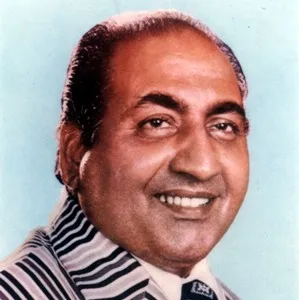‘We have learned everything, we have not learned intelligence, it is true that we are the strangers of the world.’
When the legendary KL Saigal first heard “Dil Jalta Hai Toh Jalne Do”, he was left confused. He tried to remember if he sang the number and asked, “When did I record this?” For Mukesh, who shot to instant fame with this song from Pehli Nazar, there could not have been a bigger compliment than this. In an era when every aspiring male playback singer was following Saigal, Mukesh was no exception.
Mukesh, who started his singing career by imitating Saigal and was known for his nasal and sonorous voice, carved out his own identity and voice. He may have wanted to be the second KL Saigal, but he became Mukesh, one of the finest singers of his time. His voice resonated deeply with listeners. Mukesh’s ability to convey raw emotion and vulnerability made his songs timeless. He had a unique talent for expressing pain and melancholy, which struck a chord with people across generations. The emotional depth of his voice made his music relatable and connected with audiences on a personal level. His songs often touched on universal themes like love, loss and longing, making them enduring classics. A few months before his death in 1976, he told BBC Hindi, “If I have 10 light songs and one sad song, then I will give up those 10 songs for that sad song.”

Born Mukesh Chand Mathur on 22 July 1923 in Delhi, seventeen-year-old Mukesh dreamed of becoming an actor in Hindi films. His life took an unexpected turn. Actor Motilal, who heard him sing at his sister’s wedding, paved the way for him on a journey that was far from his family’s expectations. His father, a businessman with a large family, envisioned a more conventional and “respectable” path for Mukesh: a stable white-collar job. The lure of the film industry was deemed unsuitable for a “son of a good family.” However, the mention of KL Saigal convinced Mukesh’s father, Zorvar Chand Mathur.

In the 1940s, the singer-actor pair was the norm. Taking advantage of Mukesh’s good looks, Motilal cast him in the 1941 film Nirdosh, opposite Nalini Jaywant. Unfortunately, the film was a flop and Mukesh’s debut song, “Dil Hi Ho Bujha Hua Toh,” met a similar fate. When the production house closed its doors, Mukesh was left jobless. “After this, I became a stockbroker, a dry-fruit seller and did one thing after another, as playback singing as a profession did not exist until 1942, when Debaki Bose started singing in Calcutta,” Mukesh said in an interview to BBC Hindi. According to Mukesh’s son, Nitin Mukesh and a playback singer himself, the legendary singer also tried film distribution, but that did not work out either. “He soon realised that it was better to be a first-class singer than a second-class actor. So he focused on music,” Nitin said in an interview.

Mukesh was destined to be a singer, someone who would be remembered decades after his death. He may not have had the classical training or voice of Mohammad Rafi, Talat Mahmood, Kishore or Manna Dey, but he could touch the hearts of listeners with the way he conveyed pain through his songs. A balm for broken hearts, “Dil Jalta Hai Toh Jalne De” became an instant sensation, dominating the airwaves for weeks and securing its status as a timeless classic. As Nitin recalls, “Those who entered the cinema halls came out humming this unforgettable tune that continues to resonate today.”

Under the guidance of composer Naushad, who encouraged him to adopt his own unique voice rather than imitate Saigal, Mukesh developed a distinctive style. This evolution led to the creation of timeless classics such as “Gaaye Ja Geet Milan Ke” (Mela, 1948) and “Hum Aaj Kahin Dil Kho Baithe” (Andaz, 1949). Mukesh possessed a voice of immense warmth and subtlety, a voice that invited intimacy, a confidant of the heart. His nuanced expressions, free of excessive ornamentation, were at once captivating and profound. While versatile and adaptable to various musical genres, Mukesh was particularly celebrated for his poignant renditions of melancholy. His voice became synonymous with the nation’s collective pain and longing. Songs like Sahir Ludhianvi’s hopeful “Woh Subah Kabhi Toh Aayegi” (Phir Subah Hogi, 1958), Heeraman’s heart-wrenching “Sajanwa Bairi Ho Gaye Hamaar” (Teesri Kasam, 1966), the haunting plea of “Aa Laut Ke Aaja Mere Meet” (Rani Rupmati, 1959), the melancholic beauty of “Ek Pyaar Nag ma Hai” (Shor, 1972) and “Dost Dost Na Raha” (Sangam, 1964) continue to provide solace to bruised hearts even today.

ALSO READ Why Abhishek Bachchan liked a post about divorce; and it has to do with Aishwarya Rai’s close friend
But his voice was not just a provocation. He left a mark on those who worked with him as well as those who listened to his songs. He took ownership of those songs and made them his own. Anandji Shah, one half of the legendary musical duo Kalyanji-Anandji, in an interview with The Indian Express, recalled his extensive collaboration with Mukesh. “His voice could accentuate sad songs like no one else. Ours was a time of social and romantic dramas and the way he conveyed such tender emotions was brilliant. If I look at any of our Mukesh saab songs, like ‘Koi Jo Hamara Hridaya Tod De’, ‘Chandan Sa Badan’ or ‘Mujhko Iss Raat Ki Tanhai Mein Awaaz Na Do’, it conveys a very tender emotion. In fact, we won our first National Award in 1968 for Saraswatichandra and ‘Chandan Sa Sadan’ was the showpiece,” Anandji shared.

Where did this pain come from? Nitin believes his father’s extraordinary ability to evoke pathos came not from personal hardships, but from an innate empathy. Nitin describes his father as a deeply “compassionate” person, as his kindness was evident in countless small but meaningful gestures. Even at the height of his fame, he would take time to inform the building’s cleaning staff about his upcoming trips, making sure they knew Nitin would be available if they needed anything. Once, the family ironer invited him to his daughter’s wedding, and Mukesh not only attended but also sang for the guests.
Mukesh’s unparalleled ability to evoke deep emotions is evident in his iconic rendition of “Zindagi Khwaab Hai” from Jaagte Raho (1956). Even the legendary Manna Dey acknowledged Mukesh’s supremacy in this domain, despite his own technical brilliance. Manna Dey, an avid collector of Mukesh’s discography, used to say, “Will I ever be able to sing like him? With the pain that Mukesh ji finds and channels into what he sings?”
Despite his limitations as a singer, Mukesh always outshone other male singers even when he was given fewer opportunities. A good example is the background song “Chal Ri Sajni” from Bambai Ka Babu (1960), which overshadowed Rafi’s chart-topping song “Saathi Na Koi Manzil”. Initially intended for Kishore Kumar, the song was eventually given to Mukesh after Kishore refused. Even SD Burman, known for his discerning ear, had doubts about Mukesh’s suitability for the song but was eventually captivated by his rendition.

Mukesh’s magic was evident in his collaboration with SD Burman in Bandini’s “O Jaane Waale Ho Sake Toh Laut Ke Aana” (1963). Despite the captivating beauty of Burman’s rendition of “O Re Maajhi”, Mukesh’s version proved to be the more popular choice.
ALSO READ Neha Dhupia says she is struggling: ‘I don’t remember the last time I got an offer for a Hindi film’
Although Mukesh sang most of the songs for Dilip Kumar and Manoj Kumar, it was Raj Kapoor who really made him a star. The collaboration with Dilip Kumar was brief as he later chose Talat Mahmood and then Mohammed Rafi for his playback singing. The collaboration between Raj Kapoor and Mukesh was an era-defining cinematic alchemy. Their partnership was sparked with Aag (1948), where Mukesh’s rendition of “Zinda Hoon Is Tarah” for Kapoor marked the birth of a legendary duo. When Kapoor heard Mukesh, he told him, “Ab tub sirf mere liye gaaoge.” Mukesh’s voice was the perfect counterpoint to Kapoor’s on-screen persona – a tragicomic wanderer navigating the complexities of life. Kapoor famously declared, “Mukesh meri rooh hai!” (I am merely the body, while Mukesh was the soul of my characters).
Kapoor’s portrayal of the impoverished innocent finds its most authentic expression in Mukesh’s voice. In a post-independent India grappling with the harsh realities of life, Mukesh’s ability to convey both pain and hope resonated deeply. His songs, from the timeless melodies of Barsaat (1949) to the soulful notes of “Mera Naam Joker” (1970), are etched in the nation’s collective memory. “It was amazing. They also spent a lot of time together socially,” Nitin told the Hindustan Times.
Kapoor once told a journalist, “I loved Mukesh not only because he was my ‘soul’ but also because he was the shoulder I leaned on. Mukeshchand was the most affable person I ever met, he never spoke ill of anyone. He was patient, a good listener and was much loved by all.”
Mukesh was the quintessential voice of the idealistic 1950s and 1960s. His soulful melodies reflected the optimism and empathy of the times. By the mid-1970s, as Hindi cinema evolved from a focus on social issues to action and revenge, the landscape for a singer like Mukesh changed dramatically. Demand for his signature style of heartfelt expression waned as the industry adopted a new, harsher tone. Yet even during this transition, his songs continued to top the charts, attesting to his enduring popularity.
Tragically, Mukesh passed away at the young age of 53 while on tour in the United States with Lata Mangeshkar in 1976. His untimely death was a profound loss to the music world. While he did not possess unparalleled technical prowess, Mukesh’s raw emotion and vulnerability resonated deeply with audiences. His sincerity was palpable, making him incredibly accessible. The secret to Mukesh’s enduring popularity lies in his ability to infuse heartfelt emotion into his songs.
“Initially, I thought the craze for Mukesh would fade away within five to ten years after his death. But five decades after his death, people still love me, not for me, but because they hear Mukesh in me. He was a rock star,” said Nitin, who owes his career to his late father, who remained simple till his last breath and did not allow the ways of the world to change him and hence the song “Sab Kuch Seeka Humne…” best sums up his life.











Leave a Reply